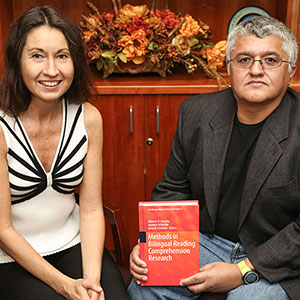TAMIU Faculty Continue Publication Efforts in Bilingual Research

Texas A&M International University (TAMIU) faculty members are providing the most up-to-date insights on how bilinguals comprehend and store information with the recent release of two published books.
TAMIU Regents Professor Dr. Roberto R. Heredia and Dr. Anna Cieślicka, associate professor of psychology, together with Dr. Alfredo Ardila, professor of communication sciences and disorders at Florida International University, and Mónica Rosselli, professor and assistant chair of psychology at Florida Atlantic University, authored “Psychology of Bilingualism: The Cognitive and Emotional World of Bilinguals.”
The recently published book was released in December 2017 by Springer International Publishing. The volume analyzes the psychological world of bilinguals and the cognitive milestones faced throughout the lifespan of bilinguals. It also integrates the most up-to-date research on bilingualism, mainly focusing on the cognitive and emotional experiences of bilinguals.
The book is the fifth volume in Springer’s “Bilingual Mind and Brain Book Series,” which Drs. Heredia and Cieślicka are co-founders and co-editors. They’ve co-authored several works, including “Bilingual Figurative Language Processing,” by Cambridge University Press, and “Methods in Bilingual Reading Comprehension Research” by Springer Press.
In addition to the book series, Heredia, together with the University at Albany-State University of New York Professor of Psychology Dr. Jeanette Altarriba, recently co-edited the second edition of “An Introduction to Bilingualism: Principles and Processes” by Routledge Press.
Initially published in 2008, the second edition is an opportunity to provide significant updates to the ever-expanding study of bilingualism, explained Heredia.
“[The second edition] is a critical addition to bilingualism literature. Our hope is that this second edition continues to fill a void in this domain, capturing the breadth and depth of work to date, on this important topic,” Heredia said.
Additionally, the new edition offers additional insights and updates concerning bilingual research, including the addition of four chapters covering neuropsychological techniques and findings from the neuroimaging field, and linguistic variation. The book delves into the current topics in bilingual studies, including outlining the benefits of bilingualism in relation to intellectual development. A new chapter on code-switching provides an overview of how and why bilinguals mix their two languages during the communicative process.
“…it is our hope that we deliver what instructors and students of bilingualism have characterized as a state-of-the-art textbook of an introduction to bilingualism, and to researchers, a guiding empirical and theoretical reference tool,” the book’s preface notes.
Heredia has been a TAMIU faculty since 1998. He holds his Ph.D. in Experimental Psychology from the University of California-Santa Cruz, and a post-doctoral position as a National Science Foundation Fellow at the University of California-San Diego. He has published in several fields, including bilingualism, evolutionary psychology, and figurative language processing.
Cieślicka holds a Ph.D. in Psycholinguistics from Adam Mickiewicz University in Poznań, Poland. She is the director of TAMIU’s Master of Science in Psychology graduate program. Her research focuses mainly on the psycholinguistics of second/foreign language acquisition and processing, bilingual lexicon, figurative language, and neuropsychology of bilingualism. She is recipient of TAMIU’s Teacher of the Year and Scholar of the Year awards and Alpha Delta KappaGolden Apple Award for teaching excellence in higher education.
For additional information, contact TAMIU’s Office of Public Relations, Marketing and Information Services at 956.326.2180, email prmis@tamiu.edu, click on tamiu.edu, or visit offices in the Sue and Radcliffe Killam Library, room 268.